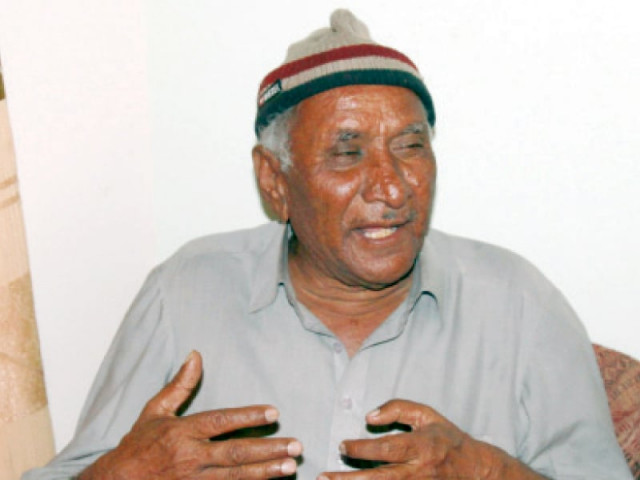Lovelorn wanderer: Thar’s prodigal son
Juman Darbadar’s life is inspired by love for one girl he could never get, and for poetry that has engulfed him...

Juman Darbadar is one of the most accomplished poets of Tharparkar of his time. His poetry has been featured in the United Nation’s Sindh chapter. PHOTO: SHAHZEB AHMED/EXPRESS
The first thing you notice about Juman Darbardar is his smile. The beaming crevice that splits the wisened features on the face of this 70-year-old makes him glow against the backdrop of the desolate, barren landscape of Tharparkar. His mischievous chuckle belies his true age - you could be forgiven for thinking him to be an adolescent teenager if you never saw his bent form.
But the truth is Juman has spent his whole life in the quest of his true love - a woman first and then poetry. His story is one of wounded loyalties, dignified pathos and increasing selflessness. His love for poetry and writing has made him one of the most accomplished poets of Tharparkar of his time, with his poetry being featured in the United Nation’s Sindh chapter. This, Juman brushes off nonchalantly. His modesty refuses to let him take pride in his accomplishments. Even at this age, the restless Juman roams the desert in a simple grey shalwar kameez with a signature turban tied around his left shoulder.
Speaking to The Express Tribune, Juman explained the inspiration behind his pen name, Darbadar, which he adapted from Shaikh Saadi’s Persian couplet that translates the six symbols of a true lover. “Cold breath, crimson face, misty-eyes, the long wait, restlessness and wanderer [darbadar],” he said. “These are the qualities of a true lover and ‘Darbadar’ has become my pen name because I have wandered all my life.”
The roll number
Juman’s starts off his biography with the roll number for his Matric exams. “My roll number was 4151,” he says, with a strong hint of nostalgia in his voice. “My life’s itinerary started off with my Matric exams. I boarded the bus for Mirpurkhas for the first time, with only three rupees in my pocket.”
While his class fellows stayed at a hotel near the examination centre, he slept under a pole in a nearby park. On the first night there, two men from his village saw him and took him to their quarters where they gave him a place to sleep and food to eat for the next three days.
After he passed the exams, he went to the district education officer’s (DEO) office in Mirpurkhas with his academic certificates, seeking a job. The DEO kicked him out of the office, screaming that there was no job for people like him.
“It was 11am but all I could see was darkness and a bleak future ahead of me,” he reminisces with a mysterious smile. “The future was indeed bleak, but only in terms of love.”
As he walked out of the DEO’s office, he glanced upon a small kiosk selling tea. Juman approached the stall owner for employment. He was hired on the spot. Ironically, his first order was from the DEO’s office. “I opened the door of his room, went inside and gently placed the cup of tea on his table,” he recalled. “The moment the DEO saw me, he frowned and asked why I had come back again.”
Only this time, Juman replied very calmly that he had not come to seek a job but to provide him [the DEO] with tea. He then tore all his certificates and left the room, leaving a wide-eyed official in his wake.
For the next two years, Juman worked at the tea stall, running errands for the owner and delivering tea to the houses and offices nearby. It was during this period of his life that he developed his love for reading - a love that would overwhelm and transform his life.
Each night, after finishing his chores, Juman would rent a book for a single paisa from the small makeshift library next to the tea stall. “I devoured the entire collection in the library in the lamp light of the dhaba during the nights while the other workers slept,” he says. “Reading changed my life - my thoughts, my perceptions.”
Love-struck
And then came the final blow that graduated him into a full-time wanderer. “It was the year 1963,” he says, as if it was only yesterday. An order for tea had come from a house located near the kiosk. “There was a curtain on the entrance. I knocked like this,” he says, rapping the table with his knuckles. “Tea is here, I said loudly. All of a sudden, a slender female wrist, wearing a bracelet, sneaked out from behind the curtain to fetch the tea.” Juman was smitten. “That was the moment,” he says, his face blushing crimson red. “It captured my heart and soul simultaneously. My hands shivered, there were goose bumps all over my body and the teapot went crashing to the floor.”
So crazed was Juman to see her face that he would follow her to school every morning. He never could gather the courage to speak to her. Neither did he ever see her face as she wore a veil.
Then came the summer vacations and the girl left for Lahore with her family. Naturally, he couldn’t wait for her to come back. He quit his job and left for Lahore. “It was June 4 - the day I set off for Lahore,” he says. “Till Khanpur, I travelled on the train without a ticket. From there onwards, I walked. When I finally reached Lahore, it was the evening of June 21.”
All Darbadar knew was that she was staying somewhere near Mall Road. “I went to the Mall Road’s public parks and stayed there for a few days, singing and amusing people with my poetry,” he said. “It didn’t take long for me to become a famous personality among the locals,” he says mischievously. “Then came the day she came to the park with her cousins and saw me.”
To Juman’s surprise, she knew exactly why he was there. “That was the first time she spoke to me. She was quite angry and asked me why I had come there,” he said sheepishly. “You will embarrass me in front of my family, she said.”
After that incident, the girl with her family, and Darbadar, alone, returned to Mirpurkhas. They stayed in touch for a few days until her mother came to know about their affair. She called him to her place and pleaded him to leave her daughter alone. “And I left her,” he says with a poignant tone. “I couldn’t say no to a mother’s plea. That is how we Tharis are.”
With writing by Shahzeb Ahmed
Published in The Express Tribune, January 30th, 2015.



















COMMENTS
Comments are moderated and generally will be posted if they are on-topic and not abusive.
For more information, please see our Comments FAQ